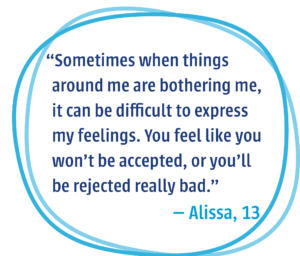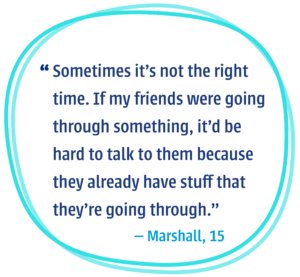Unraveling the Stigma: Exploring Barriers to Mental Health Support Among U.S. Teens
Introduction
 Unraveling the Stigma: Exploring Barriers to Mental Health Support Among U.S. Teens, original research by The Jed Foundation (JED), made possible by the support of the Morgan Stanley Alliance for Children’s Mental Health, investigates the extent to which stigma is a barrier in help-seeking for teens, what other barriers are present, and where youth are turning for support. The report aims to start a dialogue about what caring adults like parents and teachers, as well as peers can do to better support teen help-seeking behaviors.
Unraveling the Stigma: Exploring Barriers to Mental Health Support Among U.S. Teens, original research by The Jed Foundation (JED), made possible by the support of the Morgan Stanley Alliance for Children’s Mental Health, investigates the extent to which stigma is a barrier in help-seeking for teens, what other barriers are present, and where youth are turning for support. The report aims to start a dialogue about what caring adults like parents and teachers, as well as peers can do to better support teen help-seeking behaviors.
Mental health stigma generally encompasses negative and often unfair attitudes, beliefs, and behaviors regarding people with mental health conditions. People who carry stigma-related fears, attitudes, and beliefs are less likely to access care and follow through with treatment for their mental health needs — but stigma has been largely understudied among teen populations.
Unraveling the Stigma is based on qualitative and quantitative research from a national sampling of more than 1,500 teens ages 13 to 17. The study found that stigma isn’t the top barrier for teens seeking help and that they primarily turn to non-judgmental parents for emotional support.
Key Findings
Although 74% of teens say it is a sign of strength to reach out for their mental health…
- 42% say they lack the words to ask for help
- 33% say it is hard to find safe moments to talk
- 48% say they would only seek out professional help as a last resort
Top reasons that teens don’t seek help include:
- They fear others won’t understand them
- They feel like talking about difficult feelings would make them uncomfortable
- They don’t want to be a burden
Top reasons that teens hesitate to confide in other teens include:
- They fear their peers will tell others
- They feel unsure how their peers could help
- They worry their peers would not want to hear about the problem
A Continuum of Barriers
To synthesize these findings, JED created a continuum of barriers to seeking help, outlining what stands in the way of young people reaching out for help, including:

Additional Research Findings
- More than half (59%) of teens are most likely to reach out to an adult if they are worried about a friend being suicidal and 43% are less likely to reach out if they are suicidal.
- Teens prefer that adults listen to their mental health concerns without judgment and keep conversations confidential, whenever possible.
- When teens seek out support online, they are most likely to use TikTok (43%), YouTube (39%) and Instagram (38%).
- Stigma-related barriers are higher among Asian, Hispanic/Latinx, Black/African American and LGBTQ+ teens, reducing their tendency to reach out for support compared to peers surveyed in the study.
- Teens may be more likely to experience stigma-related barriers when it comes to sharing information with friends than adults.
The report also features a roadmap for supportive adults to help protect the young people in their lives. It calls for improving education about mental health resources and educating adults to understand and address barriers teens face so they can initiate open and honest conversations with young people.
Key Takeaways
To better support teens, adults can:
- Create more robust educational opportunities for them to learn about mental health
- Model help-seeking behaviors and provide clear examples of what it looks like to reach out for help
- Provide more positive messages about mental health
- Emphasize that teen mental health is not just the responsibility of parents. Everyone has a role to play.
Acknowledgments
We would like to thank the members of the project team, including the JED team and our research partners at C+R Research.
Our deepest thanks to our research participants and their families, for their valuable participation in our study. Your insights and feedback contributed significantly to our research, and we are truly appreciative of your time and effort.
Finally, we are grateful for the generous funding, support, and guidance provided by the Morgan Stanley Alliance for Children’s Mental Health, which made this project possible.
For media inquiries or interview opportunities about the report, please contact Justin Barbo, director of public relations at JED, at justin@jedfoundation.org or media@jedfoundation.org.






